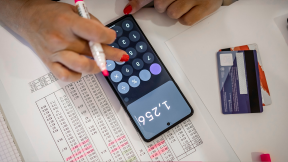Life hacks for when to use a credit card vs. debit card

Credit and debit cards are almost identical in appearance, but there are different situations when it may be ideal to use one over the other. Consumers may need to decide which card they should keep in their wallets and which to use when making a large purchase. Although both offer convenience and protection, when should you use a debit vs. credit card?
The main differences between a credit card vs. debit card
Debit cards and credit cards can both be used to pay for goods or services, but there are key differences in how each card works. Take a look at the differences here:
Credit Card
- You borrow money from the credit card issuer to make purchases and repay it at a later date.
- Using a credit card may help build your credit history.
- If you don't pay your bill in full every month by the payment due date, you may be charged interest.
- You may not need to worry about having cash on hand with a credit card.
- You may have to pay late fees, cash advance fees and balance transfer fees.
Debit Card
- You make purchases by deducting money directly from your checking account, rather than on a loan from a bank or issuer.
- Debit cards usually won't help you build credit history.
- Because this isn’t a loan, you won't have to worry about interest charges.
- You'll need to have money in your checking account to make purchases.
- You may have to pay overdraft fees or a fee for using an ATM outside your bank's network.
3 times to consider using a credit card
Credit cards may provide flexibility and convenience when used responsibly, but keep in mind that you'll want to avoid having a balance every month to ensure that interest charges do not accumulate. Here are some of the best times to use a credit card:
When you're making a big purchase
Using your credit card for a big purchase can be a way to earn rewards without having to use it too frequently. Many cards also come with a new cardmember bonus, and you may be able to easily meet the spending requirements with one large purchase.
Some credit cards also offer promotional rates, which could help you pay off your balance without interest. For example, low intro APR means that you won't have to pay interest during the length of the introductory period. It can help you avoid interest until your balance is paid off, as long as you do so before the interest-free period ends. If you're still carrying a balance at that time, you'll be charged interest.
When you want to earn rewards
Using your credit card for expenses may come with perks, including earning rewards for your purchases. If your card is part of a rewards program, you can earn rewards that can be redeemed for discounts and other perks. Many cards offer rewards for purchases at grocery stores and gas stations. Finding and using a card that aligns with your everyday spending habits can help you earn points and rewards, which you wouldn't be able to do with cash.
When you're traveling
If you're a frequent traveler, using a credit card to book a trip may be a smart idea because it can provide an easy way to book tickets and hotels online. Not only is it convenient, but a travel credit card may provide rewards points, which can be used on future trips. There are travel credit cards on the market, which allow you to accumulate points or travel miles. These add up and, in some cases, may earn you a free or discounted trip.
3 times to consider using a debit card
Credit cards are quick and convenient, but debit cards can be too. Here are 3 situations when using a debit card might be the best option.
When you're trying to avoid debt
Using a debit card may be a good way to manage your finances. Because your debit card is connected to your checking account, you can only spend from your available balance.
A debit card can provide the same convenience that a credit card can, without the need to stress about accumulating debt. If you're trying to find a better way to manage your money and live within your means, a debit card may help you by only allowing you to spend what's in your account.
When you want to pay for everyday purchases
Debit cards can be quick and easy tools when you're making everyday purchases. If you're looking to pay for things like gas, food, coffee and other relatively small purchases, debit cards will limit you to spending only what's available in your checking account. When using your debit card, you can avoid interest charges each month because you’re not borrowing money for your purchases.
When you don't want to carry cash
Sometimes it's inconvenient to carry cash. Using your debit card is a convenient alternative. If you do need to access cash though, you can use your debit card with pin number at the ATM.
Choose the card that works best for you
There isn't necessarily a better card to use, it just depends on how you want to spend and manage your money. Deciding whether to use a credit card vs. a debit card comes down to your spending habits and circumstances. Knowing both the benefits and the financial implications of both kinds of cards can empower you to make the best decisions.



